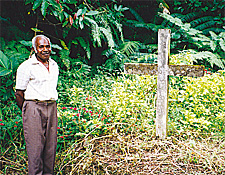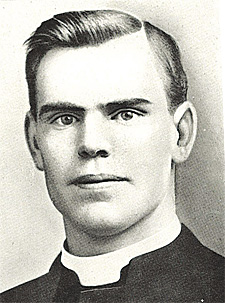Veteran Sydney journalist Alan Gill wrote an article for the Church Times recently (13/10/06), focusing on the murder of Australian missionaries who died in the Second World War in New Guinea.
Usually referred to as The New Guinea Martyrs, their deaths are remembered every year on 2 September.
The 13 Anglican men, women and children were based close to where the Japanese landed in July 1942. They were stabbed and beheaded. It has always been accepted that they were murdered by the Japanese, but Alan Gill reveals that it is now thought that some were murdered by tribal people, or died after being betrayed to the Japanese.
They are truly called "martyrs', for they were in that country as missionaries, serving the cause of the gospel of Jesus Christ.
 I read recently of the death of another "martyr', a leading official of the Indonesian Reformed Presbyterian Church. On 16 October " the day this year's Synod commenced " the Rev Irianto Kongoli was killed in Palu in Central Sulawesi. This 40-year-old clergyman was shopping with his wife in a market, when he was approached from behind and shot in the neck. Doctors couldn't save his life.
I read recently of the death of another "martyr', a leading official of the Indonesian Reformed Presbyterian Church. On 16 October " the day this year's Synod commenced " the Rev Irianto Kongoli was killed in Palu in Central Sulawesi. This 40-year-old clergyman was shopping with his wife in a market, when he was approached from behind and shot in the neck. Doctors couldn't save his life.
He and other church leaders had been protesting about the unjust trial and execution of three Roman Catholics. I expressed my sadness at his death to a leading Reformed churchman here in Sydney, who replied tensely, "Margaret, he was not killed, he was executed!'
In Synod last month we had a debate about the meaning of the word "martyr'. In my opinion, with the fluidity of language, the term now has a wide meaning. It doesn't just mean those who have had an opportunity to renounce their faith but who have refused.
Today it can be quite properly applied to those who have been killed because it is known they are Christian or because of their Christian witness.
In the safety and comfort of Christian community in Australia, with the freedoms of speech, and gathering that we enjoy " and that we must always safeguard " it is sometimes hard to appreciate the lack of freedom, or the danger from Christian life and witness in some other countries.
The Synod debate arose over a young man who has his own memorial window in the Cash Chapel at Moore College. Charles Godden, from Euroa in Central Victoria, studied for two years at Moore College and was ordained by the Archbishop of Sydney in 1899, becoming Curate at St Michael's, Surry Hills.
In 1890 the Bishop of Melanesia, Cecil Wilson preached at the church, and spoke of the islanders "crying out for someone to teach them the gospel'. Charles Godden offered for missionary service immediately. He wrote to his minister back in Victoria, "there have already been six martyrs" .I shall therefore have the opportunity of glorifying God by my devotedness to the lost sheep whom the Good Shepherd is seeking'.
It was the time of the blackbirding era, when Pacific Islanders were taken, usually by force, to become indentured labourers in the sugarcane plantations in Queensland. It made the people bitter.
Charles went to the area now called Vanuatu. At 24 years of age he was a lone missionary, visiting people on the coast by boat and journeying inland to minister to the people in the mountains. He returned to Sydney twice, in 1903, when he became engaged to Eva Dearin of the Surry Hills congregation, and again in 1905 to marry at St Michael's. His best man was the Rev David Knox, father of the Rev Dr Broughton Knox.
While back in Sydney Godden spent some time translating Mark's Gospel into the local language for use in his missionary work. He and his wife returned to the Lolowai mission in April 1906 and that same year, on 16th October (again the day our Synod met) he was murdered by an escaped blackbirded labourer. As he lay dying Godden said "Let there be no fighting because of me" Let there be peace'.
 He was the first Australian missionary to die in Melanesia, and is Moore College's first and only martyr. Next year an Australian delegation including a representative from Sydney will travel to Vanuatu to mark the centenary of his death. The New Testament in the Lombaha language has just been completed and will be published with the help of the Diocese of Sydney.
He was the first Australian missionary to die in Melanesia, and is Moore College's first and only martyr. Next year an Australian delegation including a representative from Sydney will travel to Vanuatu to mark the centenary of his death. The New Testament in the Lombaha language has just been completed and will be published with the help of the Diocese of Sydney.
Give thanks to God for the life and witness of Charles Godden, and all who have died in the service of Christ.
I am indebted to the Rev Dr John Harris for the information about Charles Godden from his Moore Matters article "Our forgotten martyr'.






















